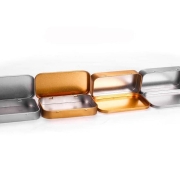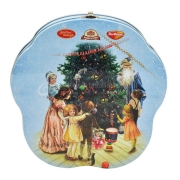Custom tins Material Comparison: Aluminum, Tinplate, and Other Materials
Choosing the right material for your custom tin can significantly impact packaging performance and brand perception. We found that material choice affects not only the physical protection of your product but also the consumer’s purchasing decision. Different materials commonly used for custom tins – specifically aluminum, tinplate, and other alternatives – are used, with Tsing choosing tinplate as the primary material, offering an excellent balance between durability and printability for packaging ranging from gourmet food to premium cosmetics. Its magnetic properties enable innovative retail displays, while its structural integrity ensures that the product arrives intact and undamaged. Aluminum alternatives offer a lightweight solution for travel products, weighing 30-40% less than tinplate. Newer materials, such as stainless steel, cater to the ultra-premium market but are significantly more affordable.
Aluminum Custom Tins: A Balance of Weight and Performance
Due to its exceptional lightweight properties and natural corrosion resistance, the material excels in applications where portability is critical, such as travel-sized cosmetics or single-serving food. Unlike tinplate, aluminum offers basic moisture protection without the need for additional coatings, making it more cost-effective for simple packaging applications. However, we recognize the limitations of aluminum, which is more susceptible to dents during shipping and lacks the structural rigidity of tinplate. In addition, while aluminum exhibits excellent corrosion resistance, further surface treatments or coatings may be necessary to maintain a consistent appearance, particularly in harsh environmental conditions. While effective, these treatments can add to overall production costs and complexity. In some cases, aluminum’s reflective properties can also be a double-edged sword. At the same time, it provides visual appeal and may not be suitable for brands that prefer a softer, matte finish.
Tinplate Custom Tins: The Best Choice for Most Applications
Made from steel sheets coated with a thin layer of tin, tinplate combines the strength of steel with superior corrosion resistance. This makes it particularly important in food packaging, as the tin layer prevents reactions with acidic or alkaline substances. From a manufacturing perspective, tinplate offers unparalleled advantages: it is easier to print than aluminum, allowing for higher-resolution graphics and more vibrant colors. We have developed specialized surface treatments to enhance ink adhesion, ensuring the packaging retains its visual appeal throughout the product’s lifecycle. The material’s magnetic properties enable innovative retail displays and security closures that aluminum cannot match. In pressure tests, our tinplate tins withstand 40% more pressure than comparable aluminum containers, making them ideal for products that require withstanding the rigors of transportation. Perhaps most importantly, tinplate cans can be recycled infinitely without losing quality, which meets consumers’ growing demand for sustainable packaging.
Stainless Steel: Perfect for the Luxury Market
Stainless steel is a better choice for custom cans when absolute durability and a high-end appearance are required. Although much more expensive than tinplate or aluminum packaging, it has unparalleled durability and environmental resistance. Tsing reserves this material for high-value applications where the packaging is an integral part of the product experience, such as premium teas, collectible spirits, or luxury skincare products. The inherent weight of the material lends it a sense of heft that consumers associate with quality, while its scratch resistance lends it a timeless appearance. From a technical perspective, stainless steel offers superior resistance to moisture and oxygen, extending the shelf life of products beyond that of other metals.
Environmental Impact Analysis of Custom Tin Materials
Sustainability has become a key factor in selecting custom can materials, and each material offers different environmental advantages. Tinplate is the most environmentally friendly option, producing just 2.1 kg of CO2 per kg of tinplate, compared to 8.9 kg of CO2 for aluminum. Both materials are infinitely recyclable; however, tinplate has a lower melting point, making its recycling process 30% more energy-efficient. Aluminum, although more energy-intensive to produce initially, can be lighter, resulting in fewer emissions during transportation. For local deliveries, tinplate generally has a lower carbon footprint, while for long-distance transport, aluminum’s weight advantage can sometimes offset its higher production impact. Stainless steel, while durable, has the highest carbon footprint of the three primary materials. Recent case studies have demonstrated that brands utilizing our recycled tinplate tins have achieved a 30-40% reduction in packaging-related emissions while maintaining a premium product appearance.
Automated Tinplate Manufacturing Process
We utilize electroplating technology to form an ultra-thin yet uniform layer of tin over the existing tin layer, using 40% less tin than traditional methods while providing superior corrosion protection. We utilize advanced offset printing technology that uses non-volatile compounds (VOCs) inks to produce realistic graphics without compromising recyclability. Each can pass through an automated quality control station that detects defects with a resolution of 0.01mm, ensuring consistent excellence throughout production. Tsing’s strength lies in our ability to customize every aspect of the production process. We can adjust the tin plating thickness to suit the product’s acidity or modify the steel alloy composition to meet specific strength requirements. We developed a proprietary tinplate formulation for one high-end chocolate client that enhanced the product’s flavor by creating an ideal micro-environment within the can. Our production equipment offers strong guarantees, and the matching mold temperature machine ensures excellent compatibility, allowing us to produce customized cans tailored to your specific needs.
Ensure customized cans meet and exceed consumer expectations
While aluminum is light and stainless steel is luxurious, tinplate remains the gold standard for versatile, sustainable custom tins. Tsing’s expertise in tinplate packaging manufacturing provides packaging that protects the product, enhances the brand image, and respects the earth’s environment. Utilizing advanced finishing and design techniques will ensure that custom tins meet and exceed consumer expectations.










-180x180.jpg)

 Facebook
Facebook Twitter
Twitter Linkedin
Linkedin
